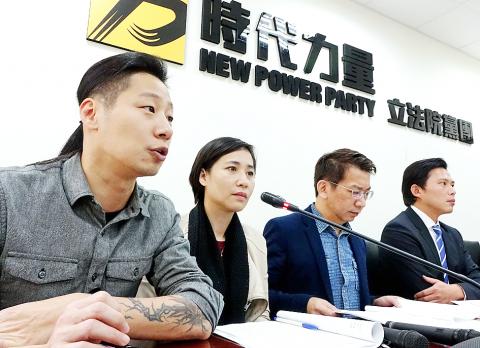The New Power Party (NPP) caucus yesterday proposed amendments to the Referendum Act (公民投票法) to lower referendum thresholds and the minimum voting age and switch to a plurality voting system.
At a post-caucus press conference, the NPP said it would modify the act to lower the signature threshold from 0.5 percent to 0.01 percent of the electorate to initiate a referendum proposal and lower the threshold to put a referendum proposal to a vote from 5 percent to 1.5 percent of the electorate.
“The Referendum Act is often described as a birdcage act, because its thresholds are set so high that it deprives people of their rights to referendum and makes referendums a tool of large parties capable of mobilizing a large number of voters,” NPP Legislator Hsu Yung-ming (徐永明) said.

Photo: Chu Pei-hsiung, Taipei Times
The party also proposed lowering the minimum voting age from 20 to 18, establishing absentee voting and shifting to a plurality voting system from the simple majority system, under which a referendum proposal is passed when more than 50 percent of eligible voters cast ballots and when more than 50 percent of the ballots cast are in approval of the proposal.
While average voter turnout is about 70 percent in Taiwan, the so-called “double-50-percent thresholds” are advantageous to opponents of a referendum proposal, because their parties can vote down a proposal simply by persuading 20 percent of the public not to vote, making the act unfair, Hsu said.
The NPP plans to revise the act to include Aborigines’ rights to be informed of and approve Aboriginal affairs, as well as allowing people to vote on modifications to territory.
NPP Legislator Kawlo Iyun Pacidal said many laws were made without taking into consideration the rights of Aborigines, and because they are minorities, the government should not resort to public votes to decide Aboriginal-related affairs, which should be determined by Aborigines themselves.
The party proposed to abolish a provision mandating the establishment of the Information and Communication Security Technology Center as an administrative institution of the Ministry of Science and Technology.
NPP Legislator Huang Kuo-chang (黃國昌) said that information security is national security, which should not be put in the hands of a low-level, semi-government body not invested with the power to investigate.
The center should not be formed as a research institute of the ministry, whose duties do not involve information security, but should be run as an independent, cyberpolice-like agency with investigative rights under the National Security Bureau or the Ministry of the Interior, Huang said.
National Cheng Kung University professor Li Jung-shian (李忠憲) said a semi-government security agency could actually harm information security, as the center’s employees are not government officials bound by government laws, meaning they might reveal sensitive data to China after they retire from the center.
“The hasty establishment of the center [as an entity run by the ministry] would only impede reformation, so the NPP proposes to abolish its establishment,” Huang said.

ANOTHER EMERGES: The CWA yesterday said this year’s fourth storm of the typhoon season had formed in the South China Sea, but was not expected to affect Taiwan Tropical Storm Gaemi has intensified slightly as it heads toward Taiwan, where it is expected to affect the country in the coming days, the Central Weather Administration (CWA) said yesterday. As of 8am yesterday, the 120km-radius storm was 800km southeast of Oluanpi (鵝鑾鼻), Taiwan’s southernmost tip, moving at 9kph northwest, the agency said. A sea warning for Gaemi could be issued tonight at the earliest, it said, adding that the storm is projected to be closest to Taiwan on Wednesday or Thursday. Gaemi’s potential effect on Taiwan remains unclear, as that would depend on its direction, radius and intensity, forecasters said. Former Weather Forecast

As COVID-19 cases in Japan have been increasing for 10 consecutive weeks, people should get vaccinated before visiting the nation, the Centers for Disease Control (CDC) said. The centers reported 773 hospitalizations and 124 deaths related to COVID-19 in Taiwan last week. CDC Epidemic Intelligence Center Director Guo Hung-wei (郭宏偉) on Tuesday said the number of weekly COVID-19 cases reported in Japan has been increasing since mid-May and surpassed 55,000 cases from July 8 to July 14. The average number of COVID-19 patients at Japan’s healthcare facilities that week was also 1.39 times that of the week before and KP.3 is the dominant

The Chinese Communist Party’s (CCP) working group for Taiwan-related policies is likely to be upgraded to a committee-level body, a report commissioned by the Mainland Affairs Council (MAC) said. As Chinese President Xi Jinping (習近平) is increasingly likely to upgrade the CCP’s Central Leading Group for Taiwan Affairs, Taiwanese authorities should prepare by researching Xi and the CCP, the report said. At the third plenary session of the 20th Central Committee of the CCP, which ended on Thursday last week, the party set a target of 2029 for the completion of some tasks, meaning that Xi is likely preparing to

US-CHINA TRADE DISPUTE: Despite Beijing’s offer of preferential treatment, the lure of China has dimmed as Taiwanese and international investors move out Japan and the US have become the favored destinations for Taiwanese graduates as China’s attraction has waned over the years, the Ministry of Labor said. According to the ministry’s latest income and employment advisory published this month, 3,215 Taiwanese university graduates from the class of 2020 went to Japan, surpassing for the first time the 2,881 graduates who went to China. A total of 2,300 graduates from the class of 2021 went to the US, compared with the 2,262 who went to China, the document showed. The trend continued for the class of 2023, of whom 1,460 went to Japan, 1,334 went to